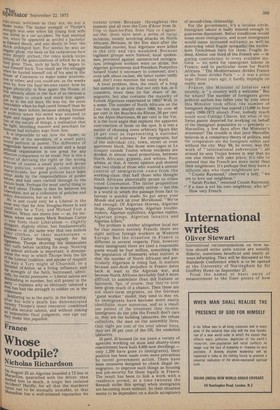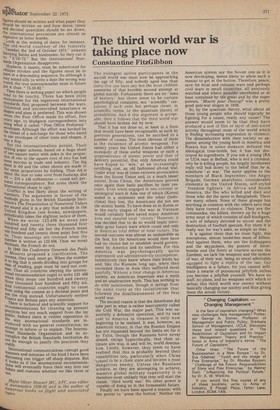International writes
Oliver Stewart
International recommendations on how nation should write unto nation are usually 'didactic, sometimes beneficial and nearly always infuriating. They will be discussed at the Standards Conference which is to be opened at the University of Nottingham by Sir Geoffrey Howe on September 27.
From the names of basic units of measurement to the finer points of how
figures should be written and What paper they should be written on and how dates, times and decimal quantities should be set down, the international provisions are almost as explosive as letter bombs. Look at the writing of dates, for instance. The old-world courtesy of the leisurely
4 Tuesaa.y.
the 2nd of October 973" irritates hurrying banks and businesses. So they cut it to: 2/10/73." But the International Standards Organisation disapproves.
rHYphens, it insists, must be substituted for Oblique strokes and the figures must be in Pairs in a descending sequence. So although it 'flay sound silly to write a date the wrong way round, the true internationalist must in future Put it thus: "73-10-02." Then there is writing paper on which people tend to be touchy. There has been little enthusiasm for the ingenious international standards first proposed between the wars. Unlimited and uncontrolled luxuriance in shapes and sizes is preferred. This was shown When the Post Office made its effort, five Years ago, to bludgeon correspondents into using what it called "Post Office Preferred" envelopes. Although the effort was backed by .the threat of a surcharge for those who dared te use envelopes of other sizes and shapes, it
as a flop.
But the internationalists persist. Their Writing paper scheme, based on a huge sheet of one square metre with sides in the proportion of one to the square root of two has had some success in trade and industry. The big sheet is A0 and the other sheets are made in the same proportions by folding. Thus A4 is
bo aut the size to take over from foolscap, and
A5 — 210 x 148 millimetres — could suit perultal correspondence. But some think the International shape is ugly. Conflict is less likely about the writing of numbers. The arguments in favour of the ethods given in the British Standards Institution's The Presentation of Numerical Values resound ahd it is a pity that nobody in the nited Kingdom (see books, newspapers, Periodicals) takes the slightest notice of them. When. we write: 123,456 we mean one flindred and twenty three thousand four nundred and fifty six but the French mean une hundred and twenty three point four five six. Those meanings are reversed when the ArniMber is written as 123.456. Then we mean uecimals, the French do not, In 1948 the Conference Generale des Poids et Mesures proposed a clarification. The 9oluMa. they said, must go. When the number Ls so big that it needs dividing into groups for
of reading, gaps must be used not corn
Thus all countries obeying the interne'lanai recommendation ought to write 123 456 NY.. hen they mean one hundred and twenty three thousand four hundred and fifty six. fond continental countries ought to cease Iroin using the comma as a decimal point and Use the stop instead. Unfortunately neither t'rance nor Britain pays any attention. "rhere is technical and scientific support for recommendations for cleaning up present Practices but not much support from the lay Indeed there is violent opposition to UIIC ttrhe Way international standards are in
oduced with no general consultation; no
attempt
to inform or to explain. The Interne
teional Standards Organisation and its ac°ThPlice the British Standards Institution do
not do enough to justify the practices they codify.
International communications corrupt good Manners and minutiae of the kind I have been ?tiscussing can trigger off sharp disputes. But „ looks as if the international recommendanls will eventually force their way into our
'wits and customs whether we like them or not.



































 Previous page
Previous page